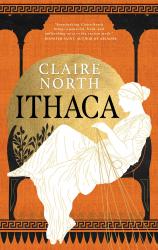Ithaca
Review
Ithaca
The nature of myth involves a degree of reimagining to communicate something universal to a modern audience. THE ODYSSEY is familiar among English classrooms, and I’ve read my fair share of retellings. Anything involving Greek myth holds close to my heart. However, of all the perspectives that have been presented, ITHACA is among the most original of these takes.
Claire North’s latest novel revolves around Penelope, the wife of Odysseus, in her journey as mother and queen in a vulnerable state. It is set 17 years after Odysseus and all the men of fighting capability left the small, overlooked island of Ithaca for the Trojan War. It has been seven years since the war ended, and the men are still not home. Suitors are overstaying their welcome, overwhelming Odysseus’ palace and taking advantage of guests’ rights. They are all vying for Penelope’s hand as many presume that her husband is dead. Telemachus, the son of Odysseus and Penelope, is trying to rule in his father’s stead and distinguish himself from his mother’s guidance. As he sees it, what hero hides behind his mother’s skirts?
"North has penned a beautiful character study, offering a nuanced take on feminism, power dynamics and the identity of mothers. The groundwork laid for the sequels leaves relationships to be repaired and characters to face further growth."
These are familiar story beats, but Ithaca faces more danger than just the suitors. Pirates attack the island’s shores, and Illyrians invade from the north. With the men gone, the Greeks need someone who both invaders and pirates can fear. For that, a mercenary named Priene is sought out to train the women of Ithaca to fight; when they do, no man is to be left alive to tell. This will be Ithaca’s secret.
ITHACA focuses on more than Penelope’s plotting for the survival of herself and her country. The situation turns volatile with the arrival of the children of Agamemnon, Elektra and Orestes. Their father was killed by their mother, Clytemnestra, and they believe her to be hiding in Ithaca. It is made clear that for Orestes to take the throne and be respected as ruler, he must be the one to kill his “murderess” mother.
This launches the story of the death of the last true queen, defined by the goddess Hera as a woman ruling independently of her husband. All ports are closed on the island until the wanted queen is found. A choice will need to be made by Penelope whether to protect her cousin or her home. By the end of the narrative, there will be consequences to explore in future installments of the series, especially as Telemachus leaves to find his father and Penelope becomes distraught. At that moment, everyone sees that she is not just a queen, but also a mother, which is just as important to her identity.
The novel is told from Hera’s point of view, offering a wholly unique perspective and a strong voice. Not many retellings of Greek mythos have prominently featured Hera, so it’s a breath of fresh air to see nuance added to a character often portrayed as “the woman scorned.” Her narration guides the tale as she sprinkles in humorous opinions regarding various recognizable names.
The book shines and is clearly written for the women, telling the stories the poets won’t. These characters are given depth; they are entertainingly and deeply flawed, ultimately grappling with their own place in a patriarchal society. We see the hypocrisy within the power dynamics. Athena identifies with and cares more for the men, and Penelope tells one of her maids how she will actively manipulate her if necessary. Athena has conversations with Hera about which women matter and even states, “Who cares about mothers?”
North has penned a beautiful character study, offering a nuanced take on feminism, power dynamics and the identity of mothers. The groundwork laid for the sequels leaves relationships to be repaired and characters to face further growth. We are given a closing montage in ITHACA for the future to come in what is sure to be an insightful, original and assumption-cutting series.
Reviewed by Eleni Karavoussianis on September 23, 2022
Ithaca
- Publication Date: April 18, 2023
- Genres: Fiction, Historical Fiction
- Paperback: 416 pages
- Publisher: Redhook
- ISBN-10: 031666880X
- ISBN-13: 9780316668804




